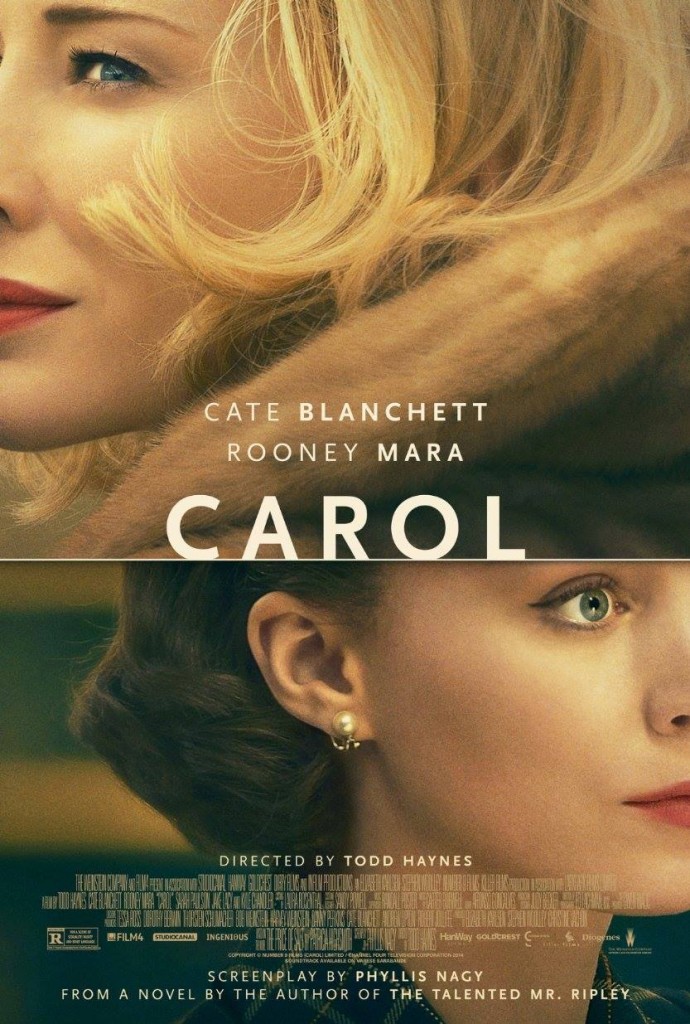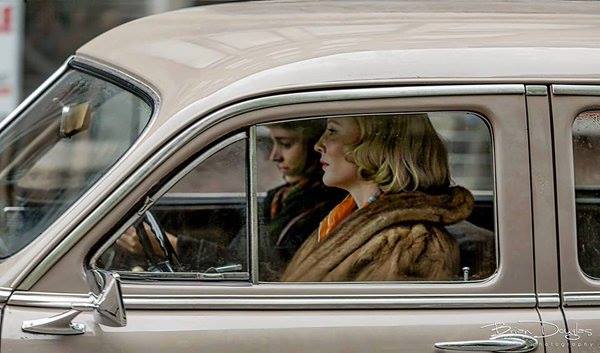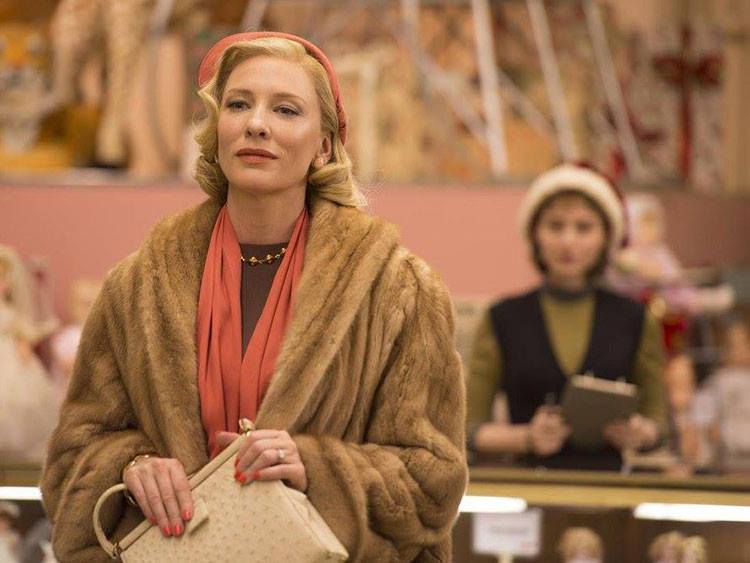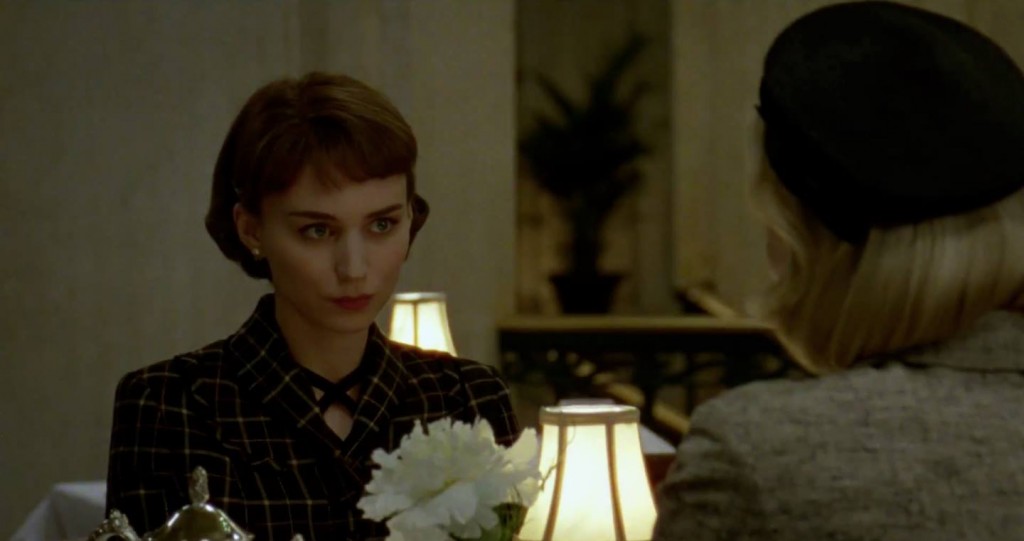Some would say that period stories depicting universal compassion and good faith are inauthentic. Todd Hayne’s Carol, based on the book by Patricia Highsmith, belies this notion. A drama about same-sex love in pre-Stonewall New York sounds like an inevitable high tragedy, but Carol employs this expectation and subverts it to create something altogether more interesting and appealing.
The main character, in a structural sense, is Therese Belivet (Rooney Mara). A postwar refugee, she works a soul-draining department store job in New York City. Her boyfriend Richard (Jake Lacy) is pressuring her to marry him, but she remains hesitant and unfulfilled until a chance encounter with a customer, Carol Aird (Cate Blanchett). The two keep finding excuses to interact—Carol leaves her gloves behind, so Therese sends them back with a letter, Carol then invites her to lunch. With very minimal dialogue, Mara depicts her character’s realization that she is being courted, that this is something that two women can do, and that she is enjoying it in a way she has never imagined before.
The character of Carol begins the movie as a mysterious, unflappable vision of beauty. The movie follows the novel’s intense third-person limited perspective, so at first we only see Carol from the perspective of Therese. But as Therese begins to bloom with happiness and potential as a result of the older woman’s attention, we see more and more from Carol’s perspective and her true vulnerability is revealed. She is attempting to divorce her husband, Harge (Kyle Chandler), but he is trying to win sole custody of their daughter by gathering evidence of Carol’s “deviance.”
I’m not the biggest consumer of romance films, but Carol succeeds in two ways that I have never observed before in the genre. First, it never compromises the characters’ emotions or motivations in order to service the plot. There is certainly high drama and tension between the characters, but none of it feels forced or artificial. Second, it is the first film I’ve seen with the ambition to film the subjective experience of falling in love. An absolutely riveting sequence takes place the first time Therese gets into Carol’s car. Without quite assuming a first-person perspective, the camera focuses on only a small portion of Carol at a time, while on the soundtrack Carol’s words become incomprehensible. Therese is overwhelmed by Carol’s presence and so too are we.
Mara carries this and countless other scenes nonverbally, taking on the difficult task of investing us in a character with a rich internal world who is intensely introverted and yields little explicit information to other characters or in voiceover. Her alienation is carried across in blocking, in the subtext of conversations, and in her expressions. As the film continues, we see her fashion and her demeanor change. Therese is never an effusive character, and she certainly feels passive and out of control for most of the film. But ultimately, her realization of her intrinsic value and her exercise of her own agency form the arc of the film.
Therese faces the struggle of youth, the question of what she needs to do to be happy. Carol faces the struggle of an older woman who needs to solve the problem of how to be happy when two aspects of her life that she needs are seemingly irreconcilable. Due to the constraints and mores of the ‘50s setting, she alternately turns her back on romantic love and on raising her child, switching back and forth as it suits her. But the husband whose heart she broke will no longer let her lead two lives.
Since it is a relationship between women at different ages and levels of experience, the relationship between Therese and Carol is an imperfect thing. Both Carol’s friend Abby (Sarah Paulson) and Therese’s various male friends are sincerely concerned with Therese and Carol’s sheer infatuation with each other. When Carol proposes a fateful cross-country road trip with Therese, it’s clear to all concerned (except possibly Therese) what Carol’s planning for them to do. In fact, a conversation between Abby and Carol implies that this isn’t the first young woman Carol has groomed. And when Harge first discovers that Carol has invited Therese to stay at their house, his exclamation “The shopgirl?!” reminds us what a strange situation it is.
But while Carol and Therese have an imperfect relationship, there is no question it is a beautiful one. While Carol’s desires are plain, she never pushes Therese, physically or romantically, a great contrast with Richard and other men of New York. In the end, it is Therese who makes the crucial choice to escalate the relationship. When this has unintended consequences, Carol could easily blame Therese–and in a more melodramatic, less compassionate story, certainly would have. But she refuses, cradling Therese and absolving her.
The triumph of this story, both in its own time and here, is its empathy with every character. Harge is an antagonist who does terrible things, but there is no question that he is taking action due to his sincere love for his wife and daughter, and the film invites us to consider his agony and desperation. Sarah Paulson does exceptional work as Abby, a woman who loves Carol but is no longer in love with Carol. A late scene between Therese and Abby is a wonderfully understated rejection of the petty jealousy that Therese is expecting. Therese’s boyfriend Richard is the first person in whom she confides about her feelings. While he opposes her relationship with Carol, he is too fundamentally decent to forcibly stand in her way (remember this story takes place in the 1950s!). Finally, Dannie (John Magaro) is a young man who works at the New York Times who takes an interest in Therese’s photography skills. He attempts to get Therese alone and kiss her, causing her and the audience to dismiss him. But his interest in her skill is sincere and his willingness to help her survives his rejection, and accepting this as the truth turns out to be a critical turning point for Therese.
The lack of cartoonishly evil antagonists is not the only cliche that the film carefully avoids. Watching it with my friends, I was struck by the way certain story choices impacted them. The parallel that came to mind was Sweet Sweetback’s Baadasssss Song in the ways that it foreshadowed certain events and then gleefully refused to follow through as expected. I was also invited to consider the recent changes in our own society that alter the context of the film—what would have seemed didactic and political five years ago is today permitted to be “only” a well-constructed drama of a certain place and time.
The ultimate gift that Carol gives Therese is the confidence and independence to be able to choose her own path. In their final scenes together, the power differential has reversed, as Therese is now empowered to make the choice. The film’s ending is ambiguous in many respects, but it is clear that whatever they choose and whatever happens, they now admire each other on a level far beyond romantic infatuation.
Carol is a beautiful film, both in how it’s shot and in terms of the story it’s telling. Without ever using the words “gay,” “lesbian,” “straight,” “social justice,” or “civil rights,” it epitomizes humanist values simply by allowing its characters to be compassionate, multidimensional human beings. See it in theaters while you still have a chance.
Carol is in theaters now.





